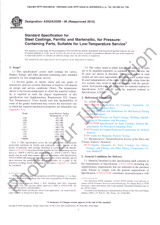Wir benötigen Ihre Einwilligung zur Verwendung der einzelnen Daten, damit Sie unter anderem Informationen zu Ihren Interessen einsehen können. Klicken Sie auf "OK", um Ihre Zustimmung zu erteilen.
ASTM D972-22
Standard Test Method for Evaporation Loss of Lubricating Greases and Oils
Name übersetzen
NORM herausgegeben am 1.12.2022
Informationen über die Norm:
Bezeichnung normen: ASTM D972-22
Anmerkung: UNGÜLTIG
Ausgabedatum normen: 1.12.2022
SKU: NS-1097579
Zahl der Seiten: 5
Gewicht ca.: 15 g (0.03 Pfund)
Land: Amerikanische technische Norm
Kategorie: Technische Normen ASTM
Kategorie - ähnliche Normen:
Die Annotation des Normtextes ASTM D972-22 :
Keywords:
evaporation, grease, oil, oil bath, rotameter, volatiles ,, ICS Number Code 75.100 (Lubricants, industrial oils and related products)
Ergänzende Informationen
| Significance and Use | ||||||||
|
5.1?The loss of volatile materials from greases and oils can adversely effect the original performance characteristics of a lubricant and therefore could be a significant factor in evaluating a lubricant for a specific use. Such volatiles can also be considered contaminants in the environment in which the lubricant is to be used. Correlation between results from this test method and service performance has not been established. 5.2?The test can be run at any agreed upon temperature between 100 ?C and 150 ?C (210 ?F to 300 ?F). Note 1:?The specified flow of air, 2.58 g/min ? 0.02 g/min, (2
L/min at standard temperature and pressure), assumes dry air. It is
not known that the original work involved dry air but it has since
been shown that this can be a factor in reproducibility and should
be addressed. A dew point of less than 10 ?C at standard
temperature and pressure will be satisfactory.
Note 2:?To determine evaporation loss at temperatures above
150 ?C (300 ?F), see Test Methods D2595.
|
||||||||
| 1. Scope | ||||||||
|
1.1?This test method covers the determination of the loss in mass by evaporation of lubricating greases and oils for applications where evaporation loss is a factor. Evaporation loss data can be obtained at any temperature in the range from 100 ?C to 150 ?C (210 ?F to 300 ?F). 1.2?The values stated in SI units are to be regarded as standard. 1.2.1?ExceptionThe values given in parentheses are for information only. 1.3?This standard does not purport to address all of the safety concerns, if any, associated with its use. It is the responsibility of the user of this standard to establish appropriate safety, health, and environmental practices and determine the applicability of regulatory limitations prior to use. 1.4?This international standard was developed in accordance with internationally recognized principles on standardization established in the Decision on Principles for the Development of International Standards, Guides and Recommendations issued by the World Trade Organization Technical Barriers to Trade (TBT) Committee. |
||||||||
| 2. Referenced Documents | ||||||||
|
Empfehlungen:
Aktualisierung der technischen Normen
Wollen Sie sich sicher sein, dass Sie nur die gültigen technischen Normen verwenden?
Wir bieten Ihnen eine Lösung, die Ihnen eine Monatsübersicht über die Aktualität der von Ihnen angewandten Normen sicher stellt.
Brauchen Sie mehr Informationen? Sehen Sie sich diese Seite an.




 Cookies
Cookies
